Wagah
Wahga (Urdu: واہگہ, Shahmukhi Punjabi: واگھا) or Wagha is a village and union council (UC 181) located in the Wahgah Zone of Lahore, Punjab, Pakistan.[1] The town is famous for the Wagah border ceremony and also serves as a goods transit terminal and a railway station between Pakistan and India.[2] Wagah is situated 600 metres (2,000 ft) west of the border and lies on the historic Grand Trunk Road between Lahore and Amritsar in India. The border is located 24 kilometres (15 mi) from Lahore and 32 kilometres (20 mi) from Amritsar. It is also 3 kilometres (1.9 mi) from the bordering village of Attari.
Wahga واہگہ | |
|---|---|
| Wahga | |
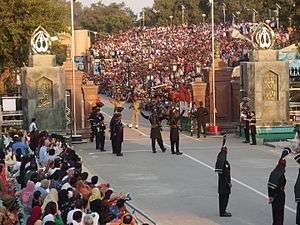 The evening flag lowering ceremony at the Pakistan–India international border near Wagah | |
.png) Location of Wagah | |
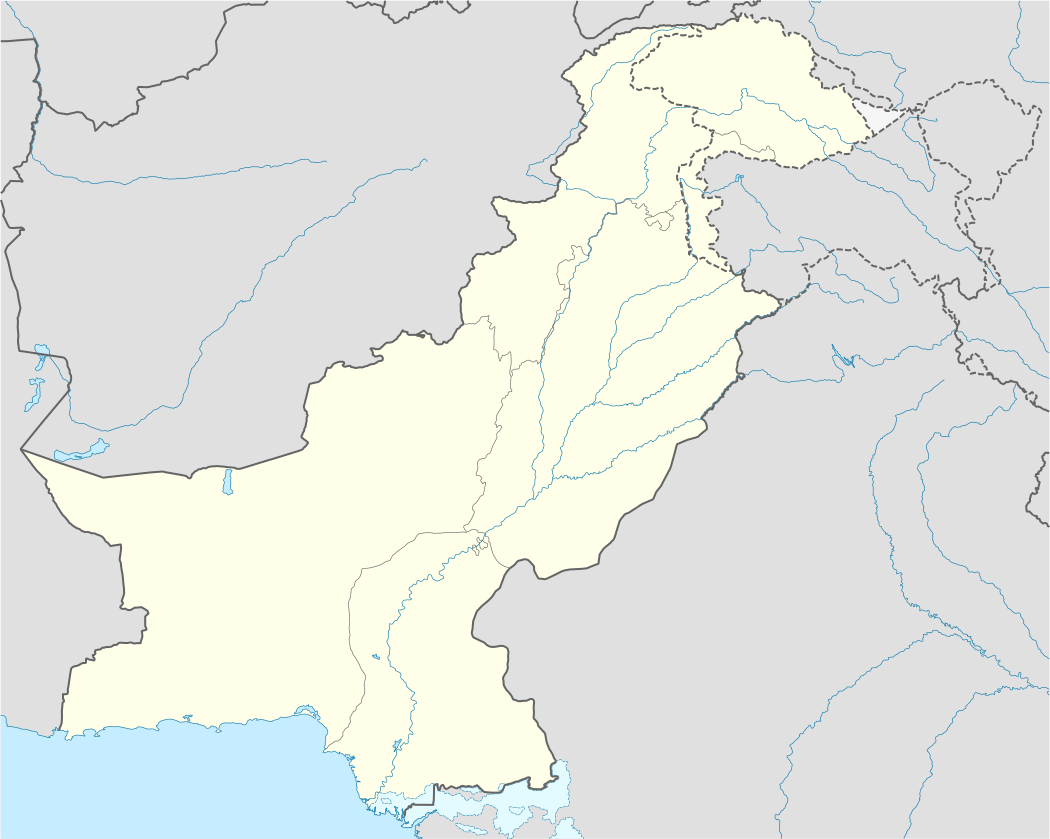 Wahga Location in Pakistan | |
| Coordinates: 31°36′17″N 74°34′23″E | |
| Country | |
| Province | Punjab |
| District | Lahore |
| Zone | Wahga |
| Union Council | 181 |
| Population | |
| • Total | Cantonment village: 26,900 Municipal corporate council: 560,968 Border: 230,008 |
| Time zone | UTC+5 (PST) |
Wagah-Attari border ceremony

Border crossing
The border crossing draws its name from Wahga village, near which the Radcliffe Line, the boundary demarcation line dividing India and Pakistan upon the Partition of British India, was drawn.[3] At the time of the independence in 1947, migrants from India entered Pakistan through this border crossing. The Wagah railway station is 400 metres (1,300 ft) to the south and 100 metres (330 ft) from the border.
Border crossing ceremony
The Wagah-Attari border ceremony happens at the border gate, two hours before sunset each day.[3] The flag ceremony is conducted by the Pakistan Rangers and Indian Border Security Force (BSF), similar to the retreat ceremonies at Ganda Singh Wala/Hussainiwala border crossing and Mahavir/Sadqi International Parade Ground border crossing. A marching ceremony, known as the "Silly Walk ceremony", is conducted each evening along with the flag ceremony. The ceremony started in 1986 as an agreement of peace, although there was not a conflict at that time. Other Middle Eastern nations have adapted similar ceremonies in recent years.
Wagah flag
Following India's erection of a 360ft (110m) flagpole on their side of the border in Attari, in August 2017, a 400ft (122m) flag was installed on the Wagah side. The pole in Attari is the largest in India.[4][5]
Gallery
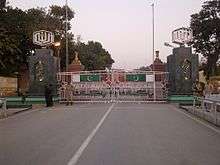 The Pakistani gate at the border crossing
The Pakistani gate at the border crossing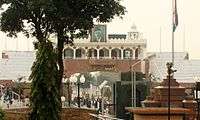 The Pakistani building at the border crossing, with a picture of Muhammad Ali Jinnah on top
The Pakistani building at the border crossing, with a picture of Muhammad Ali Jinnah on top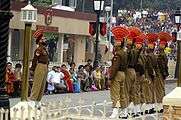 Indian BSF at Wagah
Indian BSF at Wagah Women personnel of Indian BSF at Wagah
Women personnel of Indian BSF at Wagah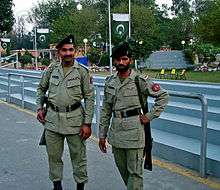 Punjab Rangers at Waga
Punjab Rangers at Waga- Milestone near Wagah Border
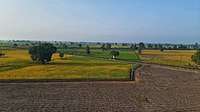 Paddy field near Wagah border
Paddy field near Wagah border
See also
- Wagha railway station
- Lahore–Wagah Branch Line
- 2014 Wagah border suicide attack
- Khyber Pass
References
- https://lgcd.punjab.gov.pk/system/files/MCLZones.pdf
- "Mixed feelings on India-Pakistan border". BBC News. 14 August 2007.
- Jacobs, Frank (3 July 2012). "Peacocks at Sunset". The New York Times.
- "Tricolour on tallest flag mast installed near Attari border - Times of India". The Times of India. Retrieved 2017-08-13.
- "Army Chief hoists flag on Wagah border". The Nation. Retrieved 2017-08-13.
External links
| Wikimedia Commons has media related to Wagah. |
![]()
- Michael Palin at the India-Pakistan border ceremony on the Pakistani side (from Himalaya with Michael Palin). BBCWorldwide video on YouTube.
- Sanjeev Bhaskar at the India-Pakistan border ceremony on the Indian side. BBCWorldwide video on YouTube.
- Pictures of independence's 60th anniversary celebration at Wagah Border